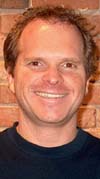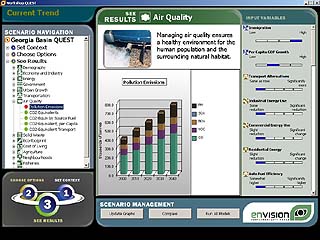
Surveys
DJC.COM
July 17, 2003
What’s your vision for Seattle’s future?
Envision Sustainability Tools

Biggs
|
Envision Sustainability Tools of Vancouver, B.C., has developed Quest, a computer game that allows people to create and visualize future scenarios for their region. The game is loaded with data on the region and runs sophisticated computer models developed at the University of British Columbia that look 40 years into the future and see the results of alternative choices.
Quest has been applied to regions on four continents. Working in cities in developed countries like the U.S., Canada, England, Australia and New Zealand to developing countries like Indonesia and Malaysia, Envision has found a great deal of common ground as regions struggle to deal with sustainability.
Involving the public
Rapidly growing metropolitan areas are challenged to understand the economic, environmental and social consequences of different choices and deal with complex and interconnected issues like housing, land use, transportation, energy use and air quality. While planning is becoming more complex, decision makers are being pressured to involve wider sets of stakeholders and citizen groups in their planning processes. It’s abundantly clear that better tools are needed to help address these challenges.

Graphics courtesy of Envision Sustainability Tools
Quest shows the trend for Vancouver, B.C.’s air quality is not good — the result of increasing population, urban sprawl and automobile use. Click here to view a larger picture.
|
Data and computer models on regional issues have improved dramatically in the past decade. Over the same period, computer games and visualization technologies have evolved beyond what anyone would have imagined.
This progress, coupled with the fact that one of the most popular computer games — Sim-City — is focused on urban planning was evidence enough to convince Envision and partners at the University of British Columbia’s Sustainable Development Research Institute (http://www.sdri.ubc.ca) to develop the world’s first urban and regional planning game based on credible data and models.
Since its first release in 1997, Quest has been revolutionizing planning by opening up the planning process, going beyond the planning and computer experts to engage a wide range of decision makers, stakeholders and the public in the creation and exploration of alternative visions for their region. Envision has noticed that clients are thrilled with the level of buy-in that is achieved through this kind of open engagement. The result is a broad constituency of support for the kind of choices that help regions move closer to economic, social and environmental goals.
Quest has a simple interface considering the years of research and development that went into creating the sophisticated modeling engine that is behind it. Users simply make some choices about urban and resource planning and growth management issues and Quest runs those decisions through simulation models to display the consequences of those choices played out over a 40-year future scenario.
Chances are that some of the consequences won’t be acceptable to the users the first time through. Play continues until a desirable future scenario is reached. This process encourages people to ask those “What if?” questions they’ve been wondering about to see what would happen. In a workshop or town hall meeting, a great deal of much needed discussion is generated and people quickly start to understand each other’s values and priorities and develop strategies to create win-win solutions.
3 versions
Quest has been developed for three different uses. The workshop version brings people together with a facilitator to collectively work through and evaluate detailed scenarios.
Whistler-Quest, for example, was used to generate four detailed scenarios for how Whistler, B.C., could develop over the next 20 years. The tool evaluates the sustainability of each scenario according to a range of criteria established by the community. The recent announcement on the success of the Vancouver/Whistler 2010 winter Olympic bid makes future analysis in the region even more timely.
The Internet version of Quest allows the public an opportunity to become involved in the process by inviting them to log on and play and then register their preferred scenario for review by decision makers.
With little publicity, Envision was surprised and encouraged to see that the Vancouver version of Internet Quest was used by over 30,000 people in the year that it was online. The load that this put on Envision’s Internet servers was a minor inconvenience compared to information that was gathered through this unique education and opinion-polling tool.
The Internet version of Quest demonstrated that there was a pent-up hunger for this kind of meaningful public discussion on growth management and sustainability issues.
After Quest was created, the concept of engaging children in discussions about long-term future scenarios for the region came up repeatedly in feedback.
In response, Quest was adapted to what Envision refers to as a decision theater version. Envision installed the first version in Vancouver’s Science World, a fun and interactive museum to teach children about science. A 230-seat theater was equipped with voting buttons on the arms of each seat. The audience watches a movie about the region and has the opportunity to make choices about the future of housing, transportation, energy, consumption and food. The movie then transports them to the year 2040 to show them the consequences of their choices.
Science World’s audience of over 500,000 per year, mostly school-age children and their families, are having great fun while learning about the impacts of some key choices on the future of Vancouver. Through Science World, Quest is becoming an important part of sustainability education in schools. Using curriculum kits before and after visits, teachers are able to draw out learning objectives.
Seattle version?
Discussions have begun with the city of Seattle and other interested partners to explore ways to develop a version of Quest for Seattle, King County or perhaps even the entire Puget Sound region.
While it is still early on in the development of the project, Envision is hopeful the software will be able to help the municipalities in the region to fulfill their requirement to update their long-term plans in 2004.
Involving the community in a fun and meaningful process to develop a vision of a sustainable Seattle might be the key to dealing with challenges like traffic gridlock and environmental degradation while maintaining a strong economy, equitable society and high quality of life for all citizens.
Dave Biggs, cofounder of Envision Sustainability Tools (www.envisiontools.com), has spent 15 years developing computer models that assist in the understanding of sustainability. He has authored several books and papers on modeling and sustainability and has facilitated over 100 Quest workshops.
Other Stories:
- Battle over keeping dams rages on
- Be prepared with a spill management plan
- Hat Island gets a drink from the sea
- Foss Waterway cleanup kicks into high gear
- Reclaimed water — a ‘new’ water supply
- LOTT dives into reclaimed water
- Clean air: saving our competitive advantage
- Europe points the way to sustainability
- Old maps handy for site investigations
- Planning for an environmental emergency
- Engineered logjams: salvation for salmon
- Pierce County maps where its rivers move
- Development can be beneficial to wetlands
- Check out properties with microbial surveys
- Sculpting a park out of a brownfield
- Charting a sustainable course for the Sound
- Water rights no longer a hidden asset
- The economics of sustainability
- Laying the path for responsible education
- Squeezing more out of renewable energy
- Controlling mosquitos and the environment
- Beavers back in force in the Seattle area
- Our future: no time or resources to waste
- Port Townsend dock promotes fish habitat
- Brownfields program is here to stay
- Master Builders teaches green homebuilding
- A salmon-friendly solution on the Snake
Copyright ©2009 Seattle Daily Journal and DJC.COM.
Comments? Questions? Contact us.